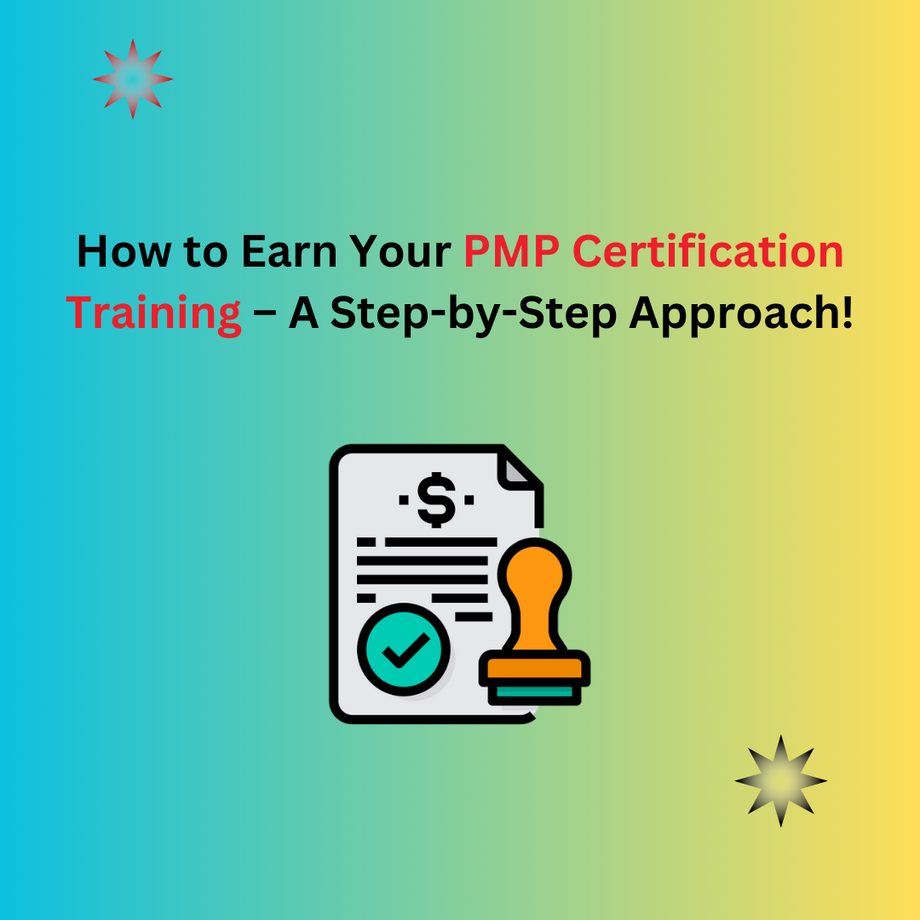Introduction :-
The Project Management Professional (PMP®) certification, offered by the Project Management Institute (PMI®), is one of the most recognized and respected certifications in the field of project management. Achieving this credential not only boosts your skills but also significantly enhances your career opportunities. If you're wondering how to earn your PMP certification, this blog provides a detailed step-by-step approach to guide you through the process.
Step 1: Meet the Eligibility Requirements:-
Before you dive into PMP Certification training and exam preparation, ensure you meet the eligibility criteria set by PMI. There are two main paths based on your educational background:
1. For a Bachelor's Degree or Higher:
- 36 months of project management experience
35 contact hours of formal study in project management or certification as a CAPM®
2. For a High School Diploma or Associate’s Degree:
- 60 months of project management experience
35 contact hours of formal study in project management or certification as a CAPM®
Make sure you accurately document your experience, as PMI requires detailed information when you apply.
Step 2: Enroll in PMP Certification Training:-
One of the key requirements for PMP certification is completing 35 hours of project management education. You can enroll in PMP certification training courses offered by PMI Registered Education Providers (R.E.P.s) or other accredited organizations.
Here’s what to look for in a training provider:
- Courses that align with the PMBOK® Guide (Project Management Body of Knowledge)
- Availability of practice tests and simulated questions
- Flexible learning options (online or in-person)
- Instructor support for answering questions and clarifying concepts
Many courses are offered online, making it convenient for working professionals to complete their training at their own pace.
Step 3: Study the PMBOK® Guide and Additional Resources:-
The PMBOK® Guide is PMI’s official reference book and the cornerstone of PMP exam preparation. However, relying solely on the PMBOK may not be enough. You should also consider using additional study materials such as:
- PMP exam prep books (like Rita Mulcahy’s PMP Exam Prep)
- Online simulators for mock exams
- Flashcards to review key concepts
- Study groups or PMP forums where you can discuss difficult topics with peers
Studying a combination of resources will give you a well-rounded understanding of the topics covered on the PMP exam.
Step 4: Apply for the PMP Exam :-
Once you’ve completed your training and gained the necessary project management experience, you’re ready to apply for the PMP exam. Follow these steps:
1. Create an account on PMI’s website.
2. Fill out the application form, which includes details about your education, project management experience, and training hours.
3. Submit your application for review. PMI usually takes 5-10 business days to process applications.
4. Pay the exam fee. The cost is $555 for non-members and $405 for PMI members.
If your application is selected for an audit, you will need to provide additional documentation, including proof of your education and project management experience.
Step 5: Schedule Your Exam:-
Once your application has been accepted, the PMP exam can be scheduled. The PMP exam is administered by Pearson VUE and can be taken either at a testing center or online with a remote proctor. Choose a date and time that gives you ample time to study.
You get 230 minutes to finish the 180 multiple-choice questions on the PMP exam.. It covers five domains: Initiating, Planning, Executing, Monitoring and Controlling, and Closing.
Step 6: Practice with Mock Exams :-
Before taking the real exam, it’s essential to practice with mock exams. Simulated exams will give you a feel for the test format and help you identify any areas that need more review. Time yourself during these practice tests to improve your speed and accuracy.
Many online platforms and PMP training providers offer PMP practice exams that mimic the structure and difficulty of the real exam. Aim to score at least 75-80% on these tests before booking your actual exam.
Step 7: Take the PMP Exam :-
On the day of your exam, ensure you are well-rested and arrive early at the test center or log in on time if you are taking the online exam. You will be allowed breaks during the exam, but use your time wisely to complete all 180 questions.
After completing the exam, you’ll immediately receive a preliminary pass or fail result. If you pass, PMI will follow up with your official certification details within a few weeks.
Step 8: Maintain Your PMP Certification :-
Your PMP certification is valid for three years, and during that time, you need to earn 60 Professional Development Units (PDUs) to maintain it. PDUs can be earned by participating in activities such as attending training, webinars, or contributing to the project management community.
Earning your PMP certification is a structured process that involves meeting eligibility requirements, completing formal training, and passing a rigorous exam. By following this step-by-step approach, you can ensure that you’re fully prepared to achieve PMP certification, which will enhance your project management skills and open new career opportunities.
FAQs
1. How long does it take to complete PMP certification?
It typically takes between 3 to 6 months to prepare and complete the PMP certification process, depending on your experience and study schedule.
2. What is the pass rate for the PMP exam?
PMI doesn’t officially release pass rates, but it’s estimated that around 60-70% of first-time test-takers pass the PMP exam.
3. Can I take the PMP exam online?
Yes, PMI offers an online proctored exam option that allows you to take the test from the comfort of your home or office.
4. Is the PMP exam difficult?
The PMP exam is challenging, but with adequate preparation and practice, many professionals pass on their first attempt.
5. What happens if I fail the PMP exam?
You can re-sit the exam up to three times within a year, but additional fees will apply for each retake.

